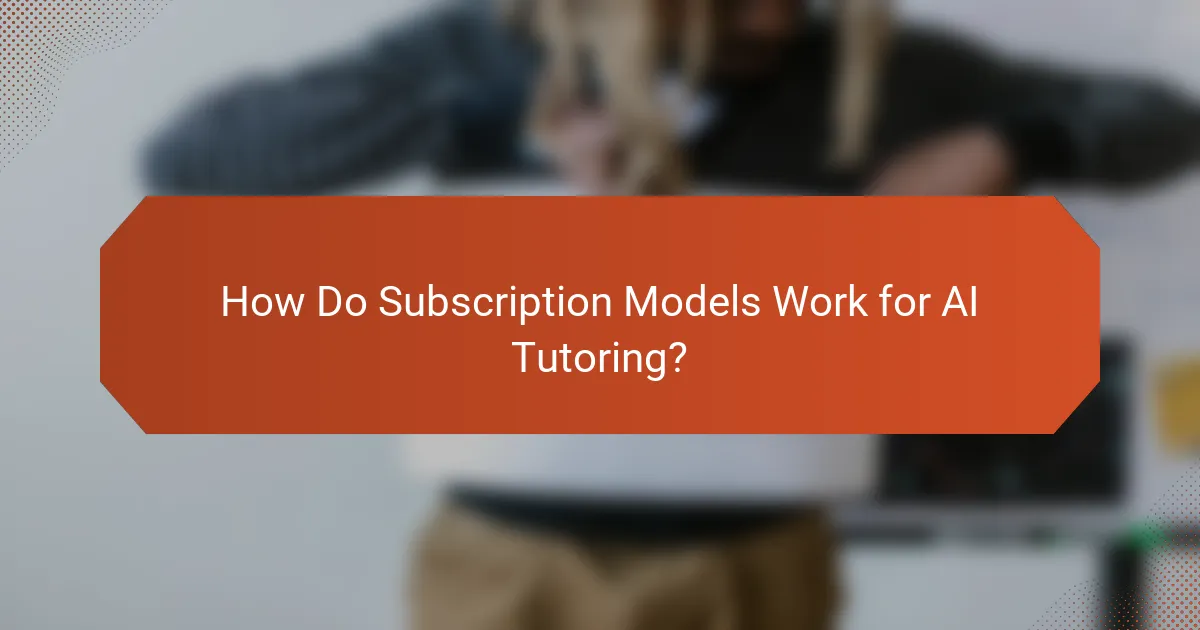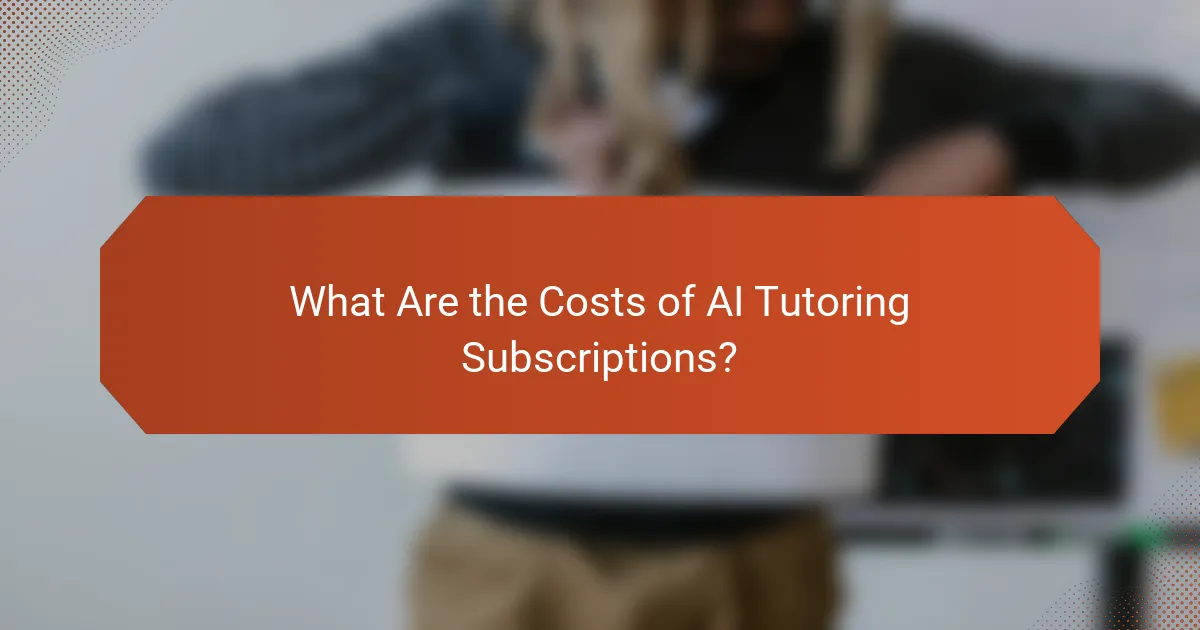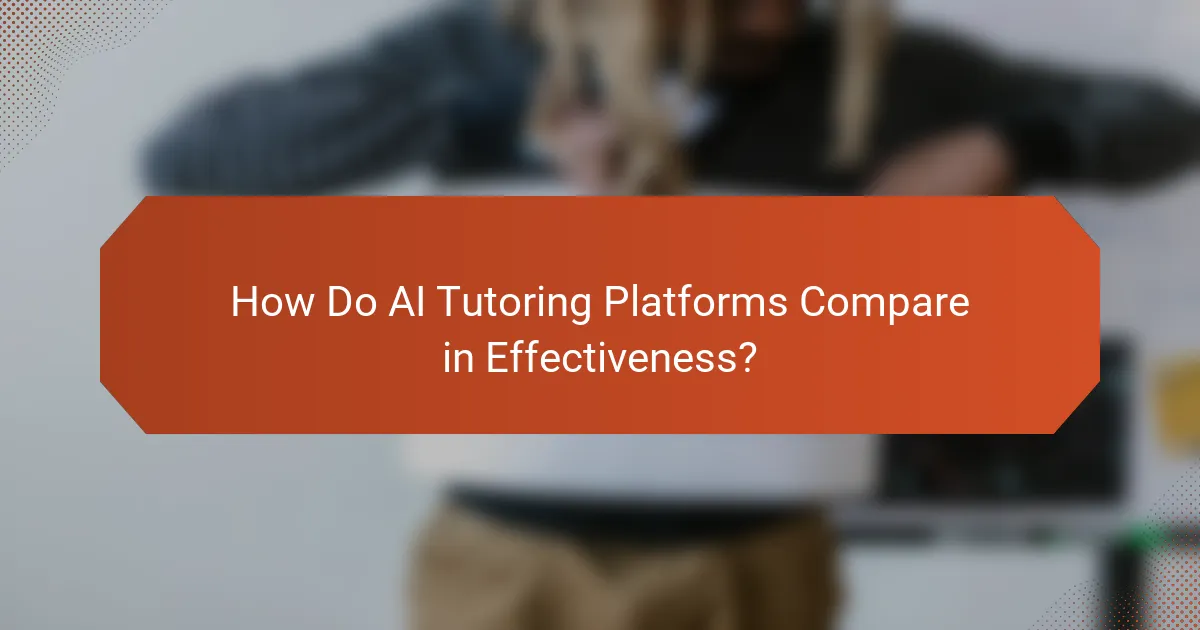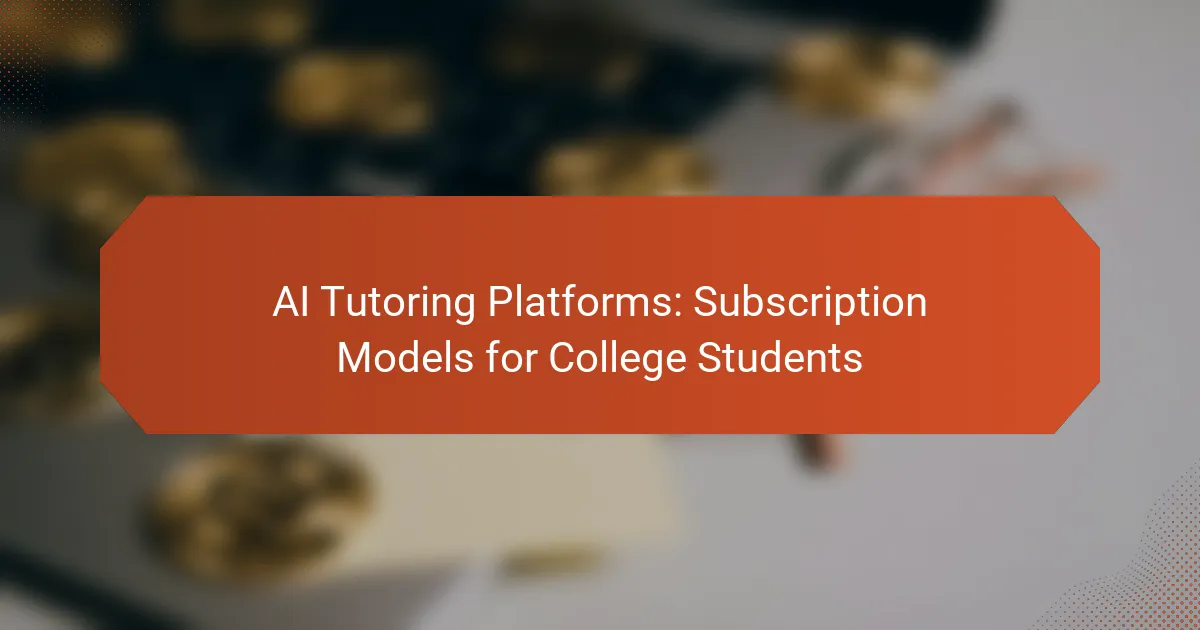AI tutoring platforms are revolutionizing the way college students approach their studies by offering personalized learning experiences and flexible subscription models. These platforms utilize advanced technology to tailor support to individual learning styles, ensuring that students receive the assistance they need for academic success. With various subscription options available, students can select a plan that aligns with their budget and educational requirements.

What Are the Best AI Tutoring Platforms for College Students?
The best AI tutoring platforms for college students offer personalized learning experiences, flexible subscription models, and a range of subject coverage. These platforms leverage artificial intelligence to adapt to individual learning styles and provide targeted support, making them valuable resources for academic success.
Khan Academy
Khan Academy is a free online resource that provides a wide array of instructional videos and practice exercises across various subjects. It uses an adaptive learning system to tailor content to students’ needs, allowing them to progress at their own pace.
While Khan Academy is free, it may not offer the same level of personalized tutoring as paid platforms. However, it serves as an excellent supplementary resource for college students looking to reinforce their understanding of complex topics.
Chegg Tutors
Chegg Tutors offers on-demand tutoring services with a subscription model that allows students to access live help from qualified tutors. Students can choose from various subjects and connect with tutors via chat or video calls, making it convenient for immediate assistance.
Chegg’s subscription plans typically range from monthly to yearly options, with costs varying based on the level of access. Students should consider their study habits and frequency of tutoring needs when selecting a plan.
Wyzant
Wyzant connects students with local and online tutors for personalized, one-on-one sessions. The platform allows students to browse tutor profiles, read reviews, and select tutors based on their expertise and teaching style.
Wyzant operates on a pay-per-session basis, which can be beneficial for students who need occasional help rather than ongoing support. Rates vary widely depending on the tutor’s experience and subject matter, so students should compare options to find the best fit for their budget.
Coursera
Coursera partners with universities and organizations to offer online courses that often include AI-driven assessments and feedback. While many courses are free, obtaining a certificate or accessing certain features may require a subscription fee.
Students can benefit from Coursera’s extensive course catalog, which covers both academic subjects and professional skills. It’s a great option for those looking to enhance their knowledge or gain credentials in specific areas.
Brainly
Brainly is a collaborative learning platform where students can ask questions and receive answers from peers and experts. It operates on a freemium model, allowing users to access basic features for free while offering premium subscriptions for additional benefits.
This platform is particularly useful for quick homework help and peer support. However, students should be cautious about the accuracy of answers and consider verifying information from reliable sources when using Brainly.

How Do Subscription Models Work for AI Tutoring?
Subscription models for AI tutoring provide students with flexible access to educational resources and personalized assistance. These models typically include options like monthly or annual payments, as well as pay-per-session arrangements, allowing students to choose what best fits their learning needs and budget.
Monthly Subscription
A monthly subscription allows students to pay a set fee each month for access to AI tutoring services. This model is ideal for those who need ongoing support but may not require it year-round. Prices can vary widely, typically ranging from $20 to $100 per month, depending on the platform and features offered.
Students should consider their study habits and course load when opting for a monthly subscription. If they anticipate needing help consistently, this model can be cost-effective. However, it’s important to review the terms, as some platforms may have limits on the number of sessions or hours included each month.
Annual Subscription
An annual subscription involves a one-time payment that covers a full year of access to AI tutoring services. This option often comes with a discount compared to monthly payments, making it a budget-friendly choice for students committed to long-term learning. Annual fees can range from $200 to $800, depending on the service level and additional resources provided.
Students should evaluate their academic plans before committing to an annual subscription. If they are certain about their need for tutoring throughout the year, this model can save money. However, if their needs are uncertain, they might want to start with a monthly plan to avoid wasting funds.
Pay-Per-Session
The pay-per-session model allows students to pay only for the tutoring sessions they actually use. This can be beneficial for those who need occasional help or prefer to tackle specific topics without a long-term commitment. Rates typically range from $10 to $50 per session, depending on the complexity of the subject and the platform’s pricing structure.
While this model offers flexibility, students should be cautious about potential costs adding up if they require frequent sessions. It’s advisable to keep track of usage and set a budget to avoid overspending. Additionally, some platforms may offer packages that provide discounts for purchasing multiple sessions in advance, which can be a smart way to save money while ensuring access to necessary support.

What Are the Costs of AI Tutoring Subscriptions?
The costs of AI tutoring subscriptions can vary widely, typically ranging from around $20 to $100 per month, depending on the platform and features offered. Students should consider their budget, the level of support needed, and the specific subjects they require assistance with when evaluating these options.
Average Monthly Costs
Most AI tutoring platforms charge a monthly subscription fee that can fall within a range of $20 to $100. Basic plans may offer limited access to tutoring sessions, while premium plans often include additional features such as personalized learning paths and 24/7 support. It’s essential to compare what each plan offers to determine the best value for your needs.
For instance, platforms like Chegg and Khan Academy may have different pricing structures, with Chegg typically on the higher end due to its extensive resources. Students should evaluate their specific academic requirements to choose the most cost-effective option.
Discounts for Students
Many AI tutoring platforms offer discounts specifically for college students, often ranging from 10% to 30% off the regular subscription price. These discounts can significantly reduce the overall cost, making it more affordable for students to access quality tutoring services.
To take advantage of these discounts, students usually need to verify their student status through a university email address or student ID. Always check the platform’s website for any promotional offers or seasonal discounts that may be available.
Free Trials Available
Several AI tutoring platforms provide free trials, allowing students to explore the service before committing to a subscription. These trials typically last from a week to a month and give users access to a limited set of features or sessions.
Utilizing a free trial can be a smart way to assess the platform’s effectiveness and compatibility with your learning style. Be sure to read the terms carefully, as some platforms may automatically charge you after the trial period unless you cancel in advance.

What Features Should College Students Look for in AI Tutoring Platforms?
College students should prioritize features that enhance their learning experience, such as personalized learning plans, round-the-clock availability, and a wide range of subjects. These elements ensure that students receive tailored support that fits their unique academic needs and schedules.
Personalized Learning Plans
Personalized learning plans are essential as they adapt to each student’s strengths, weaknesses, and learning pace. An effective AI tutoring platform should assess a student’s current knowledge and create a customized roadmap to help them achieve their academic goals.
Look for platforms that utilize data analytics to track progress and adjust the learning plan accordingly. This dynamic approach can significantly enhance understanding and retention of material, making study sessions more productive.
24/7 Availability
24/7 availability is a critical feature for college students who often have unpredictable schedules. AI tutoring platforms that offer round-the-clock access allow students to seek help whenever they need it, whether it’s late at night or during a study break.
This flexibility can be particularly beneficial during exam periods or when tackling challenging assignments. Ensure the platform provides instant responses or resources to facilitate learning at any hour.
Subject Variety
A wide range of subjects is vital for students who may need assistance in multiple areas. Look for AI tutoring platforms that cover core subjects like mathematics, science, and languages, as well as specialized topics relevant to your major.
Having access to diverse subjects ensures that students can find help for any course, reducing the stress of juggling different academic demands. Check if the platform offers resources for both introductory and advanced levels to cater to varying academic needs.

How Do AI Tutoring Platforms Compare in Effectiveness?
AI tutoring platforms can significantly enhance learning outcomes for college students by providing personalized assistance and adaptive learning experiences. Their effectiveness is often measured through various performance metrics and user feedback, which help in evaluating their impact on academic success.
Student Performance Metrics
Student performance metrics typically include grades, retention rates, and engagement levels. Many AI tutoring platforms report improvements in these areas, with some users experiencing grade increases of 10-20% after consistent use. Metrics like time spent on tasks and completion rates also provide insight into how effectively students are utilizing these tools.
When evaluating AI tutoring platforms, consider how they track and report these metrics. Look for platforms that offer detailed analytics, enabling students to monitor their progress and identify areas needing improvement. This data-driven approach can help students make informed decisions about their study habits.
Feedback from Users
User feedback is crucial in assessing the effectiveness of AI tutoring platforms. Many students report positive experiences, highlighting the convenience and personalized nature of the assistance provided. Common themes in reviews include improved understanding of complex subjects and increased confidence in academic abilities.
However, some users express concerns about the limitations of AI, such as the lack of human interaction and occasional inaccuracies in explanations. It’s essential for prospective users to read reviews and consider both the strengths and weaknesses of each platform before committing to a subscription. Engaging with trial periods can also offer valuable insights into a platform’s suitability for individual learning needs.
